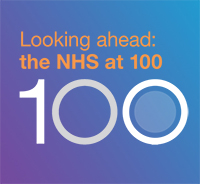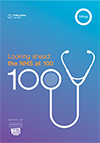Comment / Preparing for a changing health service
 To mark the 70th birthday of the NHS, the HFMA invited a number of commentators to look ahead to what the NHS might look like in 30 years’ time, examining both the obstacles it will face and the opportunities to enhance health and healthcare. Here, former HFMA president Tony Whitfield talks about the continued importance of understanding how clinical systems work – learning from the past to help plan for future uncertainties. And he highlights the need to think about how people can be incentivised to manage their own lifestyles.
To mark the 70th birthday of the NHS, the HFMA invited a number of commentators to look ahead to what the NHS might look like in 30 years’ time, examining both the obstacles it will face and the opportunities to enhance health and healthcare. Here, former HFMA president Tony Whitfield talks about the continued importance of understanding how clinical systems work – learning from the past to help plan for future uncertainties. And he highlights the need to think about how people can be incentivised to manage their own lifestyles.
Trying to imagine what the NHS will look like in 2048 and, in fact, what the whole world will look like then, is completely impossible. But I can reflect on what changes I have seen through my time in the NHS and make some extrapolations.
When I was president of HFMA in 2013 my theme was Knowing the business. I believe giving maximum value and understanding your contribution requires an innate sense of curiosity in investigating and understanding why things happen the way they do.
My point back in 2013 and now is that finance staff need to have a good awareness of clinical systems and where medical science is taking us, so we can make good decisions today and plan well for a sustainable future.
I recall my mother, a district nurse in the 1970s, making reference to the atypical patients on her case load; atypical because they had reached 80 years of age. Now, I suspect that for many of today’s community nursing staff, 80 might well be the median age of their caseload.
I also recall in the 1980s most hospitals having public appeals to acquire their first MRI scanners, at that time predominantly to aid orthopaedic departments. It was a piece of kit that was seen as desirable, but not essential to patient management. Today advanced diagnostics are an indispensable part of diagnoses and treatment of patients across a vast spectrum of conditions, from major trauma to life extending cancer care.
Benjamin Franklin is often quoted as saying that only two things in life are certain: death and taxes. Death in 2048 will be as inevitable as it is now, but the real question is what that median age will be and what it will mean for our services.
By 2048 we need to be having more candid conversations with citizens about the components for good health. We need to have developed ways of incentivising individuals to manage their own lifestyles that will ultimately give the best opportunity for a long and healthy life.
However, we also need to recognise that the cost of managing care is likely to increase, because ultimately even the healthiest lifestyle will succumb to the realities of old age. We should celebrate this and be excited about it, but we must also cater for it in the way we plan services.
In 1948 there was a belief that once everyone was able to access the NHS and receive treatment, costs would then reduce. We are rightly very proud of our NHS and a funding system that enables care to be given ‘free at the point of need’. But even if 100% of our gross domestic product could be invested in the NHS, it still wouldn’t be enough. There will always be more that could be done and, inevitably, patients with certain conditions will still feel short changed by the system.
A shortcoming of a taxation-based system is it creates only tenuous links between the cost of healthcare and the citizen and is subject to political and economic sensitivities. It does nothing to incentivise the individual to actively participate in creating the best possible chances for good health for themselves and their families. While many people actively manage their lifestyle, many take a less participative approach, which will ultimately lead to adverse consequences for them personally and for taxpayers generally.
I would like to see the finance function leading in work to think through alternative or add-on systems that give citizens the right level of safeguard of care, free at the point of need, but create the personal incentives to lead healthier lifestyles.
As in the past, healthcare services will continue to grow through steady incremental progress, driven by our relentless desire to improve and develop what we currently have to be better in the future. There will be breakthrough discoveries that bring a completely fresh approach to many treatments.
By 2048 artificial intelligence, automation and other leading edge technologies will make a massive difference to the way healthcare is delivered. But high quality, patient-centred, compassionate care will still require people, in sufficient numbers, properly skilled and with the right values to deliver expectations of citizens.
We should never lose sight of where human endeavour has taken us – from living in caves to where we are now – and I will always be optimistic that that endeavour will continue to be well placed in the future.

Looking ahead: the NHS at 100. To mark the 70th birthday of the NHS on 5 July 2018, the HFMA has carried out some long-term thinking about the factors that will impact on the financial future of health and social care over the next 30 years, taking it through to its 100th birthday in 2048.
NHS@100 blogs
Caroline Clarke on embracing future technology
Rob Whiteman on a transforming role for finance
Sanjay Agrawal on changing the balance of responsibility
Anita Charlesworth on workforce key to meeting demographic challenge
Related content
The value masterclass shares examples of organisations and systems that have pursued a value-driven approach and the results they have achieved.
This webinar series offers colleagues of ICS organisations the opportunity to discuss common priorities, challenges, and successes within their field.